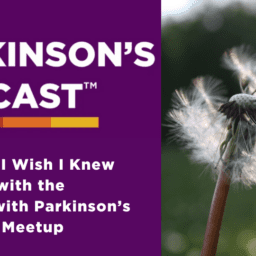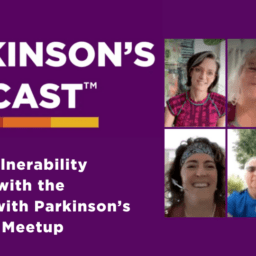Receiving a Parkinson’s diagnosis when you’re young is overwhelming enough. Being a woman with a Parkinson’s diagnosis adds an additional layer of complexities and challenges.
In this panel discussion, our YOPD Women’s Council and special guests Dr. Jill Farmer and Vicki Dillon discuss everyone’s unique journey with medications; the many types, classes, and possible side effects of Parkinson’s medications; and the importance of trying a variety of medication combinations until you find the best fit for you.
You can watch the video below.
To download the audio, click here.
You can read the transcript below. To download the transcript, click here.
Note: This transcript is not a flawless word-for-word transcript, but it is close.
Melani Dizon (Director of Education and Research, Davis Phinney Foundation):
All right. Hello and welcome everybody to our YOPD Women’s Council. My name is Melani Dizon. I’m the director of education and research at the Davis Phinney Foundation. And we’re really, really glad to have you here today. We have a lot of new faces on the screen that you might be noticing if you were with us last month. And you’re going to get a chance to say hello to all of them and learn from this great group of people. A couple of things before we get started, you’ll see, at the bottom I have enabled the live transcript. If you do not like having the text on your screen, all you have to do is click the little arrow next to where it says CC, and then say hide subtitle. And you don’t have to see the screen. If you click the chat icon at the bottom of your screen, a little box will pop up to the right.
If you could do that right now, I would love for you to say hello and tell us where you’re from so that I know that you can see and hear us. And then we also know who you are. There we go. Charlotte, North Carolina, Robin, Maryland, Ohio. Excellent. Thank you guys for joining us. Chicago. Great. Ooh from Perth. Awesome. Great. Thank you for being here. Hi from the UK.
We will be recording this. So, if you have to leave early, don’t worry. We will be sure to send this to you when it’s available. And during the session, if you want to ask a question and you only want the panelists to see it, make sure that you click that little arrow on the blue button that says panelists and just type your message there.
If you are okay with everybody seeing your question or your comment, be sure to pick all panelists and attendees and everyone will be able to see it. We have Leigh who is in the background, she’s from the Davis Phinney Foundation. She is going to be sharing any links about topics that we talk about, resources that we might mention, and those will all be shared in the chat box. And you don’t have to worry about writing everything down, we will share those in the follow-up emails. So, you can be sure that we will get that. Okay, great. So, I just wanted to make sure I wasn’t missing an important message. Okay. Soania, I’m going to pass it over to you. Dr. Soania Mathur. She is part of this YOPD Women’s Council. She is also one of our members of our board of directors. She’s done a lot of moderating webinars with us and is just a longtime friend of the foundation. So, thank you so much for hosting this one, Soania,
Soania Mathur, MD (Davis Phinney Foundation Board of Directors member and YOPD Women’s Council Leader):
Thank you Mel. Welcome everyone to the second in our webinar series, YOPD women. Everyone of course is welcome to join, but the reason that it’s important, we decided to dedicate this type of forum to women with young onset Parkinson’s disease, is that the disease affects us differently, physically with the influence and variability of hormones and cycles, and emotionally we tend to be at very different points in our lives compared to with our older counterparts. We’re still often in the throes of young families, you know, busy with work and career and busy social commitments and so forth. That’s why it’s particularly important as women with YOPD to come together, support each other and learn from each other’s experience. So today what we’re going to chat about is medical management of PD, and the medications that are used. We’ll spend some time on dopamine agonists, which although they work for many can still have some pretty devastating effects for some and we’ll hear about that today.
In a moment, all of the other lovely women on the panel, will introduce themselves. But first I’d like to introduce our guest, Dr. Jill Farmer. Dr. Farmer is an assistant professor of neurology and director of the Parkinson’s Disease and Movement Disorder program. At Global Neurosciences Institute, she’s developed a comprehensive movement sort of program to address medical management, surgical management, and rehab strategies for patients with Parkinson’s disease and other movement disorders. We are very grateful that you could join us for this discussion, Dr. Farmer. Also joining us today is Vicki Dillon, who was diagnosed, I think it was at age 32, when you were working as a pediatric nurse at the time. And Vicky’s a really powerful vocal advocate, particularly with regards to getting GDNF back into clinical trials, which we’re all supporting her on.
And she’s also in a couple of documentaries, but the one titled, “Sex, Lies, and Parkinson’s,” I think might be relevant to today’s topic. And we’re really looking forward to getting her input on our discussion. But Vicki I’ll let you start off by saying anything else. Actually, let me start with one thing before I get everyone on the panel to introduce yourselves. Actually, when you introduce yourself, tell us where you’re from and if you feel comfortable, what medications you’re on, cause it’s kind of relevant to today’s discussion. I mean, I think that’s a question we always ask, you know, hi, how are you, what meds are you on? That seems to be the order of things.
But first I just want to start with a cautionary statement that any medications that are discussed today are just personal information and not any sort of endorsement or recommendation. Any medication changes should be made under the guidance of your own physician, because everyone’s health is unique, and all medications are not suitable for everyone. And not only that but stopping certain medications on your own can be quite dangerous. So, any changes that need to be made should be made on your physician supervision. I’ll start off and then I’ll ask Vicki too.
As Mel mentioned, my name is Soania Mathur. I’m a physician and I have had the privilege of being involved with this Foundation for a bit of time. I live outside of Toronto in Canada, and I’ve been on a lot of medications over the past 22 years, since my diagnosis, including dopamine agonists for a number of years, I recently discontinued them and I’m currently on Sinemet, amantadine and a long-acting dopamine medication called Stalevo. Vicki. Hi.
Vicki Dillon (Former Pediatric Nurse, Parkinson’s advocate, writer and speaker) Hi. Do you want me to, just to tell my story?
Soania Mathur:
Sure. Yeah, that’d be great.
Vicki Dillon:
Okay. Well, it’s lovely to be asked and lovely to see everybody. So, I had symptoms, like you said, first of all at 32, but I wasn’t diagnosed till 35, it took three long years. And I had PD written on my forehead in neon lights. So how they didn’t realize what was wrong with me was ridiculous really when I look back. And I was diagnosed on Valentine’s day. I always say my friends got an engagement ring. I got Parkinson’s. Which is just about my look, but that was well, that was in 2007. So, it’s been a while now. Just have my 14th official anniversary and in many ways, yeah, it kicked me in the teeth, but it kicked me up the bum as well. And I’ve done more with my life with Parkinson’s than I probably would have ever have done starting with being promoted at work to nurse specialist, which I did for three years before I left.
And I left not because of my Parkinson’s, I left because of the media and interest. After I did “Sex, Lies & Parkinson’s” which, and the Parkinson’s community, actually their reaction, which was, it was horrible. I was really, really slated across the board and that was the worst thing that’s happened to me. It made me kind of really drop to an all-time low. But when you hit rock bottom, the only way is up sometimes. So that happened. And I ended up walking away from my career because well, pulled into the light, see the powers that be at work. And, you know, they tried to actually get me off the nursing register for bringing nursing into disrepute because I dared to talk about the effects of dopamine agonist. And if anyone’s seen the documentary, I don’t know if you have, but I’ve got a link to it so you can watch it.
It’s not horrendous. It’s not shocking. It’s quite sad. And it’s used actually in some schools of nursing, to educate the nursing students about Parkinson’s, which I’m really proud of. So, from that, well I was hit an all-time low, like I said, but I knew that the GDNF was going ahead, and I knew it was the second time round. And I’d known about how good it be in the first time around with the Amgen trial because of Tom Isaacs now don’t know how I did it, but I managed to get myself onto that trial by bringing the hospital involved and getting put through to the nurse who was in charge of recruitment. And at the time they needed six patients for the safety aspect, they had five and I was number six. So, I felt like Charlie and the chocolate factory with the golden ticket. Nobody supported my decision in my family. They all thought it was absolutely crazy, why go and volunteer for eight hours of brain surgery to have, you know, four catheters implanted deep in the putamen part of your brain and a drug that might do some harm, but when you think you’ve got no other options and you know, life’s pretty enough, then you do all kinds of mad things. So, I did it and no regrets. I was on GDNF from the start off. And I think for my second infusion, it was a massive impact on my life.
Soania Mathur:
Sorry, I don’t mean to interrupt, but maybe some of the people listening don’t know what GDNF is. Is it possible to explain?
Vicki Dillon:
Oh yeah, I’ll tell you, GDNF is a growth factor, and it stands for Glial Derived Neurotrophic Factor. It’s a natural protein we make, but obviously I have synthetic kind. And it’s the analogy of it working, it’s like putting baby bio on your fertilizer, on your tomatoes, basically in the greenhouse and encourages the growth of new neurons. And on pet scan, we all had our pet scans throughout the trial. We all across the board showed significant regrowth. So, it definitely did work, but sadly, whether it was the methodology or whatever the trial was deemed to be a failure. But the patients who actually went through the trial, we knew that it had a considerable positive effect in our lives. And we’ve been fighting since really to get people, to listen to us. Nobody wanted to listen initially. And it was kind of dead and buried, but somehow, last week we managed, you know, to be able to announce with Parkinson’s UK, that they’re going to give it another go. So, I feel so proud of that. So, I mean, we’ll get it again, but it means that future patients will hopefully have a chance of life changing treatment. So that’s amazing. That’s my proudest moment to date.
Soania Mathur:
That’s a great example of how well patient advocacy works, what you’re telling us is just so great, so congratulations.
Vicki Dillon:
Thank you. We’ve got a song as well. Our mantra is stand up, shout out and be counted. So, don’t be afraid, whatever, you know, your story is, share it because it can change lives.
Soania Mathur:
Just a second Vicki, because I just want to ask Dr. Farmer. I definitely want to hear more about your story. That’d be good. But Dr. Farmer, for a moment, GDNF that Vicky’s been discussing, is this a common medication? Are there medications like that are being used in patients? Or could you tell us a little bit about the medications that are out there?
Jill Farmer, DO, MPH (Director of Parkinson’s Disease and Movement Disorder Program at Global Neurosciences Institute):
Sure, this is not a common medication at all. It is in the annals of research that have come and gone, as you’ve just heard it’s from the past, coming back. Things kind of go in and out of Vogue and it’s always something in the academic realm that we’re aware of, but it’s not something that had been really applicable for clinical use. So, the medications that are available really have come all focused on dopamine.
The gold standard medication across the board Carbidopa/Levodopa was developed in the 1960s. And it’s sad to say that the only advancement to it has really been in its delivery. Changing the pharmacology of it has not happened. They developed fake dopamine. Like they could develop fake insulin, and the ways in which they’re trying to improve it is to get it, to be utilized in the system in a more steady state. So longer acting forms like you had mentioned, Stalevo, Stalevo is Carbidopa-Levodopa plus Entacapone, all in one pill and Entacapone is a medicine that recycles Levodopa in the gut so that it can be absorbed more easily.
There is Rytary, which is a capsular form of Carbidopa-Levodopa that has little pellets inside, again, meant to be absorbed at different rates. So, in theory, it can last a little bit longer in the system. And then there is Sinemet CR, Carbidopa-Levodopa extended release, which is a larger waxy pill that is meant to last longer, but it’s also a little bit more inconsistent because it’s large and it’s waxy. It doesn’t get absorbed as easily and as effectively as other forms of the medication. Delivery methods have changed in the pump. So, for those of you abroad, you’ve had Duodopa for a long time. It’s not quite as common here in the United States. Although I think it’s either going on its fifth or sixth year of approval. Maybe Americans are just more vain. It’s been a lot harder for us to get it utilized and approved.
Nobody seems to want to wear it, but I will tell you from my patients that do wear it, it works really well for them again, because it’s keeping that nice steady state of Levodopa in the system. They are in the process now of looking at a smaller version of the pump, not as small as anybody would like, but a lot smaller than what’s currently available. Kind of thinking about insulin pumps from the eighties and nineties. It’s a little bit larger like that, not the little egg pods that you see today. But it doesn’t require a procedure of getting infused through a tube, which is what Duodopa and Duopa does. It’s a tube that goes into the intestine. This is just subcutaneous. So, it’s a little tiny, teeny tiny needle that goes right under the skin and can infuse it for 24 hours.
Speaking of teeny tiny needles, if anybody uses Epogen, Apomorphine, that’s another version of a dopamine agonist, which doesn’t replace dopamine or is a pharmacological equivalent of it, it more mimics the way dopamine works in the system. So that class of medicines, the dopamine agonist can either come in an injectable form, like Epogen. It can come in a sublingual form called Kynmobi. And it can come in a pill or a patch form, the patch is Neupro (Rotigotine) and pills are Mirapex, (Pramipexole), and Requip (Ropinirole). And again, those are meds that work nicely on the motor symptoms of Parkinson’s. But as we’re going to get into, they can have a side effect profile that includes impulsivity and compulsivity, excessive gambling, shopping, sexual urges, things like that. So, it’s something that has to be done in combination with a specialist that understands how to regulate and moderate for them.
And then the complimentary medicines we have for this are the recyclers. So that would be the COMT-inhibitors like Entacapone, or the newer version, Opicapone, which is just taken once a day and Entacapone, has to be taken with each dose of Carbidopa/Levodopa to work. And that works in the gut. The counterpart that works in the brain are the MAOB inhibitors. That’s Rasagiline, Selegiline, Eldepryl, Xadago, and that works on not recycling Levodopa, but works on recycling the actual dopamine that the brain is making and prevents its breakdown. So those are all the dopaminergic meds and mimics in a nutshell, things like amantadine or Artane or meds that are much older, even predate Carbidopa-Levodopa and being used for Parkinson’s disease, but are not dopamine specific.
Heather Kennedy (YOPD Council and YOPD Women’s Council Leader):
Thank you for giving me my improv warmup on how to pronounce all those names.
Jill Farmer:
Oh, it’s, it’s, it’s a tongue twister.
Soania Mathur:
Now that you’ve warmed us up as well. You can start off by just telling us where you are and what meds you’re on and we’ll go around the room. Only if you feel comfortable.
Heather Kennedy:
So, for the audience that does not have Parkinson’s, we sit around at our events and we say, Hey, what do you want? What do you got? Show me, show me your stuff. So, we’re like, look what I got, you know, from inside our trench coat.. No, I’m kidding. Well, wow, that I know how to pronounce them, thank you so much, Dr. Jill, I really appreciate you. I am on the Carbidopa/Levodopa, which you know, the Sinemet, and it’s generic and it doesn’t work as well, I don’t care what anybody says. It works about 75% of what the normal stuff does. I’m sorry. That’s just the truth for me. The, also the Ritigotine, am I saying that correctly? Darn it. I’m learning that one. That’s Neupro patch. Then I’m also on the Rasagiline, that’s the Azilect. I’m on the Comtan, which is the Entacapone, to stretch the life of the Sinemet.
I take Trazadone to sleep sometimes, which I do not like in the mornings because I’m a little bit wonky in the mornings now. And they did have me on a five milligram of an anti- anxiety, but I think it might’ve been Zoloft. I think I’m on still five of one of those. It could have been, I forget what it was, but it was something to offset the results of the other meds, which is really the irony here. It’s enough to make you mad because the efficacy of these drugs fails over time, as we all know. So, you know, it’s constantly changing. People will say, Oh, you got your meds right. Great. And I’m like for this week… tune in, news at 11.
Soania Mathur:
It’s a fine balance that’s for sure. Kat, what about you? Where are you calling from?
Kat Hill (Davis Phinney Foundation Ambassador and YOPD Council and YOPD Women’s Council Leader):
I’m from Portland, Oregon. I am a retired nurse midwife and nurse practitioner. And I have had Parkinson’s for six years.
And currently I am on extended-release Carbidopa/Levodopa, the generic. I take it three times a day and I just tapered off eight milligrams of Requip. And I also take a citalopram, 10 milligrams, which is an SSRI, an antidepressant, antianxiety med, and those are kind of the, I do a lot of exercise, massage and then I’d get Botox every three months for my bilateral hand dystonia. So those are currently what I am on and I’ve got my own stories about you know… the quarantine and the home cooking and the Requip. It was a bad mix for me. I did okay before we were quarantined. So that’s why I’m off of it.
Soania Mathur:
We’ll definitely get all of that for sure. Karen.
Karen Frank:
Yeah. Hi, I’m Karen. I’m from St. Louis, Missouri. I’ve been diagnosed for three years. I was diagnosed at age 47. I had a really difficult time at the beginning with my medications, but currently I’m taking carbidopa/levodopa four times a day. I take domperidone and extra carbidopa to help with severe nausea that I was having with initial Levodopa. And currently I take Trazodone occasionally to sleep an amitriptyline as an antidepressant and to help with anxiety. And I think I’ll just save sort of the story about what happened with meds for me when we get around to that. But that’s how I am now.
Soania Mathur:
Thank you so much, Karen. Gaynor, the lovely Gaynor.
Gaynor Edwards (YOPD Women’s Council Leader and Founder of Spotlight YOPD):
I’ll just say I think we call it Entacapone. And is that right? We pronounce it differently, yeah. How did you say it, Jill?
Jill Farmer:
Entacapone or Opicapone? if you’re getting mixed up with that.
Gaynor Edwards:
Oh Yeah, that was it, Opicapone.
Jill Farmer:
Yeah, Opicapone is the new one. That’s only once a day, whereas Entacapone has to be up to five times. The brand name of Entacapone is Comtan, so I might’ve switched with that as well.
Gaynor Edwards:
Okay. I can’t remember. Now I’d have to watch the video. I’ll watch the video. I’ll watch the rerun. My name’s Gaynor I’m in Rye on the South coast. I was diagnosed at 42. I’ve mainly been on Requip XL for most of that time. So most, nearly eight years of Requip. And I’ve just been altering my drugs, not necessarily in the most controlled way. I didn’t take the advice that I should have done. But we’ll get onto that bit later. So, at the moment I’m on, I’ve traded in my Madopar I was on for a while for Sinemet, and I do the branded Sinemet. I specified that to my neurologist who specified it to my GP, who specified it to my pharmacist, that I get the branded stuff. I’m on four milligrams of Requip XL and was actually still tinkering ever so slightly in my dose of Sinemet, but not much. I’m just trying to get my pacing right.
Soania Mathur:
I mean, I asked that question not to be nosy, believe it or not, but it’s actually to illustrate a couple of things. One is that we’re all very different in terms of the medications we take, because like the disease itself, medications work differently, different people. And I think that finding that fine balance is important for each individual and then throughout different points in your journey that will change as well, where you’re trying to balance the effects of the medication and side effects. The other thing is, as Dr. Barbara mentioned is that the drugs that you have right now correlate with the dopaminergic system, yet there are many non-motor symptoms that may act through different pathways that really affect quality of life. So, when you hear taking things for sleep, or taking things for mood issues, some people will take different things for constipation, or cognitive issues. It becomes a really like a polypharmacy, which can really difficult to manage, especially when you’re trying to figure out which side effects wants which medication and, you know, that sort of thing really takes a lot of a really strong partnership with your physician in order to navigate that all. What do you recommend to patients in terms of, if they’re not feeling well, Dr. Farmer, in their meds, how do you kind of navigate through the whole range of things that are often happening?
Jill Farmer:
So, I always try to frame it positively in the sense that there are few neurodegenerative conditions that have as many options as we do. And we have quite a lot through medications, through injections, I heard someone mentioned Botox or other toxins through surgical interventions and procedures like DBS, Duopa, things like that. So, if something’s not working, we don’t have to live with it. If we can try and figure out a better way to make it work for you. Now with all medicines, we do know that there are side effects, and we also have to figure out what the priority is for the patient. Is it managing the symptom or liking how they feel on the medicine, but managing a side effect or figuring out if it’s a motor or a non-motor system? Like we were saying. So, because we have so many options available, the knee jerk reaction, doesn’t just have to be Carbidopa/Levodopa.
It can be whatever it needs to be in order to address the symptom. And there are many patients that we have to get anxiety under control before we can even broach the idea of addressing motor symptoms. And we have a lot of conversations about the interplay between emotion and motor symptoms and how nothing happens in isolation, in the brain. And so sometimes the meds that we’re using don’t work on dopamine at all right away. It works on some of the other chemicals, whether it’s serotonin or norepinephrine or whatever it might be. And then we get our way around to the dopamine. I do explain though that we can’t escape it and that we’re going to have to give it a try to have on something that modulates the dopamine. But again, for better or worse, since all of our meds are really treating symptoms and we don’t have those things like GDNF or things yet that we know specifically delay progression or change the disease.
If we don’t like how we feel on meds we don’t have to stay on something that’s not working for us. Right. Are there any caveats when dealing with young onset Parkinson’s disease in terms of medication choices?
Jill Farmer:
A lot of the questions I get really focus on, what do I do about Carbidopa/Levodopa? Is it true that if I use it now, it’ll not be effective? I’ll use it all up and it won’t be effective for what I need. And I try to educate that there is not a habituation to the medication. There is not that the medicine becomes ineffective over time, because you use too much of it too soon. The way Carbidopa/Levodopa works is that it’s taken up into the same nerves that would otherwise make dopamine and get converted from Levodopa the left-handed molecule of dopamine to dopamine, and then gets released.
So, the reason is that the reason why it stops working or is less effective over time is because of the real estate. There is less of those dopaminergic neurons to make that conversion. So, if you need it, use it. And if I have a young onset patient that is significantly impaired, motorically. They have a wicked tremor, or they’re very stiff, or they’re very rigid. They’re in a lot of pain, we’ll start with Carbidopa/Levodopa. If it’s someone that we don’t have to be overly reactionary to the symptoms they have, it’s subtle, and it’s mild, then we have the luxury of having a conversation of, well, given that you’re young, let’s talk about different strategies. Let’s talk about what side effects these different medications may have sexual impact, things like that. And see if there is another strategy besides Carbidopa/Levodopa to use. And very oftentimes there is but it really all censors on that conversation and trying to prioritize what the patient is most concerned with and alleviating the fears that if they do use the strongest medicine we have, the Carbidopa/Levodopa, that it’ll not be effective for them going forward. Cause there are, there are ways to be on it for a long time but not meeting more than you need.
Soania Mathur:
Sure. And Vicki, back to you, tell us a little bit more about your medication journey, I guess.
Vicki Dillon:
Yeah, it’s quite interesting. I started on Selegiline, which I’m still on and I love that drug. I think it’s great. Went onto Ropinirole fairly quickly and was put on the maximum dose, which wasn’t appropriate I don’t think at the time and the nausea I had was horrendous. Like you said, I was nursing at the time. I used to have to get up at four in the morning to take it so that the sickness had worn off enough for me to be able to drive into work. It was horrific, but quite quickly it changed my personality into, well my partner said, I changed into an attention seeking show off who spent rather a lot of money and was high as a kite all the time. So, for me Ropinirole cost me greatly and I’ve only just recently come off it.
So, from maximum over the years, slowly reduced and reduced and now totally off it, which I’m so pleased about. And I’ve gone on to the Neupro patch. I’m also on Stalevo. I was on 100s and I’m now on 75s. I’ve been over-medicated for a lot of my Parkinson’s journey. I’m a bit dyskinetic now, as you can tell. But today I’ve had a really rough day, so I’ve had to take extra. My gut seems to stop, have stopped working as efficiently. So, I’m also on amantadine twice a day, which is really good. And what else? Slow release Sinemet at nighttime, so I can move in bed. But for me, it’s taking my drugs with things like vitamin C to enhance the efficacy of your Levodopa, cod liver oil to stop dyskinesia, which it has really helped.
Jill Farmer
Ooo you taught me something there. I’ve never heard cod liver oil. Tell me about that.
Vicki Dillon:
Oh yeah. Do you know the lovely Lori Mischley? I’m sure you do. She’s a fantastic naturopathic doctor who specializes in Parkinson’s in America. She’s got a Parkinson’s online with school where if anybody, it’s fantastic. She’s based in Seattle and she starts all her patients, once she puts them on Levodopa, she starts them all on fish oil, but it has to be liquid and it has to be organic and it has to have high EPA, and high DHA for it to be effective. I’ve got some research which I can send the link later that showed that it reduced dyskinesia by 50%. It definitely, definitely, definitely works. Gaynor knows that I’m always singing on about it don’t you Gaynor? But yeah, it definitely definitely works for me anyway. So, anyone who’s dyskinetic I would advise trying it you’ve got nothing to lose.
What else? Oh, glutathione. I take as well now. I’m very interested in looking at the naturopathic journey and everything that I do impacts whether my medication works. So, if I don’t sleep, if I have a period, if what I eat, I’m really, really sensitive now in all aspects of my life. So, I have to be really with everything I do.
Soania Mathur:
I do want to get back to the naturopathic stuff and ask Dr. Farmer about what we know is sort of the studies that might have shown results in this area. But Karen, you had your hand up.
Karen Frank:
Yeah, I’m un-muted okay. I started out trying carbidopa levodopa, and I had severe, severe nausea and vomiting. It was so disabling to me and, you know, my doctor thought that I had a lot of anxiety, which I think looking back I did, I don’t know if it was a vomiting cycle that was being perpetuated by anxiety and then vomiting and then anxiety and vomiting. But early on, I was not having very good control because I just couldn’t keep it in my stomach. And we tried to adjunctive medication that I’m on now, Domperidone and Carbidopa. And at that time, it did not work. So, I actually went off of the medication. I was hospitalized and they did an EGD to see if there was another cause for my nausea and vomiting, because, you know, my neurologist said it was probably the worst case you’d ever seen of that.
So, they did not find another cause. And he tried me on a transdermal, dopamine agonist, patch, Rotigotine, thinking that perhaps bypassing the GI tract altogether would be helpful. I’m a recovering alcoholic. I’ve been sober 11 years. I have a very addictive personality, but I am sober. And on the dopamine agonist, I was eating all night long. I was you know, I’d wake up with like food coming out of my mouth, like half asleep covered in cookies. And I gained a large amount of weight. I was shopping and returning things and shopping and returning things. I mean, I had a stack of receipts like this tall and I really didn’t recognize that I had any abnormal behavior because I was a nurse anesthetist. I didn’t have much of a wardrobe. And when I retired, when I got diagnosed with Parkinson’s, I needed clothes.
So, I really had convinced myself that I was doing something normal. I mentioned it at a support group, and they were like, no, you need to talk to your neurologist. So, I tried Rasagiline, which really didn’t have much benefit for me. And I ended up having a hypertensive crisis by taking cough medicine with it. I ended up in the emergency room. My blood pressure was 220, over 115. And my doctor, my internist primary kind of scolded me about going to the emergency room, thinking again, it was anxiety. And I said, well, I don’t care if it was anxiety. I needed to be in the emergency room if my blood pressure was that high whatever’s causing it, whether it’s the drug reaction or not. So, I did go off of all medication because they were so severe, the side effects for me that I thought, well, I’m not that sick yet. I don’t really need it. So, what happened with me is they underwent an early deep brain stimulation evaluation that perhaps medication wasn’t going to work for me.
And interestingly enough, when I was hospitalized for that I was found to have two conditions. I have Parkinson’s disease. So, I have a GBA mutation and Parkinson’s, but I also have functional neurologic disorder symptoms from a complex history of PTSD. And they told me, you know, someday you will probably need deep brain stimulation, but right now it’s not going to help a lot of your symptoms. Some of them are Parkinson’s and some of them are something else and those require cognitive behavioral therapy and other treatments. So, my case was sort of unique. I’m treated at a big academic medical center and they presented my case to eight neurologists to discuss it and took videos and long story short my neurologist encouraged me after that to try the Levodopa again.
And I knew how important it was. You know, I’m a nurse practitioner also, and I had a father with Parkinson’s, and I said, I have to be able to take this medication because I’ll have a much better life. So, I did that. I went back on the Domperidone and back extra carbidopa for a month. And I stayed on that. And then I took micro micro, teeny, teeny, little doses of Levodopa at night, and I went to bed and that sort of got my brain used to it. And eventually I transitioned today and now I can take 8 Carbidopa/Levadopas a day. I have zero nausea and you know, my functional neurologic disorder overlays treated with, you know, psychiatric medications and psychiatric care. So that’s sort of an odd presentation, but for me, one last thing, I struggle a lot with addictive behavior, and I think that it’s still a problem on the Carbidopa/Levodopa for me, eating is a big problem and taking that hit, you know, four times a day of dopamine, dopamine, dopamine, for me, it’s really difficult. And so, managing, you know, my addictive nature is really important to my health in general. And my Parkinson’s, so sort of an odd story.
Soania Mathur:
Thank you so much, Karen, Dr. Farmer, could you just actually tell us about a couple of things that Karen mentioned, one is this functional neurologic disorder and the second is what she’s talking about in terms of addictive behavior and Sinemet or Carbidopa.
Jill Farmer:
Absolutely. So, what Karen had mentioned actually is not that unique in the sense that functional neurologic disorders are very common. And they often overlay other chronic medical conditions. The functional neurologic disorder term is the newer term for things that used to be called psychogenic or conversion disorders in setting of a history of prior trauma and things like that. But the reason why they have shifted away from that nomenclature is that there doesn’t need to be a huge defining trauma, a history of abuse, going through a fire, being in a horrible car accident, things like that. There can be this concept of cumulative trauma over time, just little things that chip away and increase the stressors in your life. That then changes the pathway of the brain.
Remember how I said the emotion and motor symptoms are interconnected. It changes how the pathways respond to the stimuli and then can manifest itself in abnormal movements, abnormal posturing, dystonias, tremors, whatever it might be. And it’s not just movement disorders. In the world of epilepsy, which is seizures, they see patients that have what’s called non epileptic seizures so that they have episodes that look like seizures but are not caused by any abnormal electrical circuitry in the brain. Outside of neurology, things like atypical chest pain, where you’ve had a workup for every single thing you can think of for a cardiac origin and you still have this chest pain that can be considered a functional disorder, same thing for abdominal issues and pain, where you have an entire workup and you’re scoped from top to bottom.
And there is nothing that they can physically anatomically see, but you’re living and experiencing these symptoms. It can be a disorder of processing in the brain. So that’s why it’s now called functional neurologic disorder because the function of the brain and being able to process stimuli appropriately is wonky in some way. And the way that you manage that is through, as Karen said, behavioral therapy, cognitive behavioral therapy, habit reversal therapies, as well as sometimes psychiatric medications, if they’re needed. Of note, the most common, one of the most common neurologic disorders that has functional overlay is Parkinson’s. So abnormal gait, abnormal tremor, abnormal dystonias, muscle contractions and things like that, that we know can happen as part of Parkinson’s or as part of our medications. But when you really worked through them and it’s out of proportion to what would be expected, that’s when we think it could be functional overlay.
So, I did want to say that if anybody who is listening in, I know we have a lot of people on this call. If you’re experiencing things that your doctor can’t quite put their finger on, they know it could be related to Parkinson’s, but it seems more than what they’re thinking. It may very well be this functional overlay. And unfortunately, my profession is horrible at this conversation. And if they tell you that it’s all in your head or that it’s stress-related, the thing is they’re not wrong, but the perception of how they say it is completely inaccurate. This is not something that we say is organic. So, your functional neurologic symptoms are not related to lower levels of dopamine than other people might have, but it is entirely a brain dysfunction. So, it’s not something that you’re thinking up or having happened to yourself. It’s not malingering. It’s not because you’re a young woman and are having anxiety. That’s not it at all. And I apologize on behalf of my profession because I know we do a really difficult and horrible job discussing this difficult topic.
But we’re working through it. There a movement afoot in the United States and abroad. Other movement disorder specialists are really trying to take hold of this and bring it back to the forefront. And there’s a collaboration between US, myself and other doctors here and Dr. Allen Carlson in Scotland and Dr. John Stone in the UK and things like that. So, we’re working on making it a much more visible and manageable diagnosis. And I forgot the other part of the question, sorry.
Soania Mathur:
No, I think it was about the nausea that people experience.
Jill Farmer:
Yes. So, the nausea for Parkinson’s is, again, a huge issue. Is it primarily Parkinson’s related? Is it because of the way that the medications can get absorbed? There is no specific medicine to treat nausea in Parkinson’s disease. Sometimes we do give extra carbidopa, which a quick aside, Sinemet, the brand name, Sinemet, Sin = without, emesis = throwing up. If anyone has seen the movie “Awakenings” with Robin Williams and Robert DeNiro, Robin Williams is playing Oliver Sacks. Those are the post encephalitic Parkinson’s patients. They’re pouring white powder on a scale, and they’re getting more and more of it. That’s Levodopa. It has horrible penetrance to get into the brain. So, you need a lot of it. Unfortunately, there’s a lot of dopaminergic receptors in the gut that get it, and it makes you really, really nauseous. So, carbidopa was added to it to again, allow you to require less Levodopa in order to cross the blood brain barrier. So, you can get an effect without being nauseous, but still with some patients, they feel very, very nauseous.
We can’t use medicines like Reglan or metoclopramide or things like Phenergan, Compazine, because they blocked dopamine. They block those dopamine receptors in the gut, but not just in the gut, they can block them everywhere. And you don’t want to block dopamine in a person with Parkinson’s disease. So, we try to use medicines like Tigan or trimethyl benzopyrene, which doesn’t block dopamine, which can sometimes these or Domperidone, but that’s a little tricky to get in the United States sometimes. So it is, there is not a great answer for it. We use a lot of behavioral strategies, you know, things that you would use if you didn’t have Parkinson’s and were nauseous, Coke syrup, pressure point patches. We try to stay away from like the Dramamine and things that for like seasickness, because that has other cognitive issues and side effects that we don’t necessarily want to deal with.
You can take the medicine with food as long as it’s not protein. So sometimes taking it with crackers or bread or things like that can make a difference. It’s the protein interaction with the Levodopa that can sometimes impede its absorption, which is why they tell patients to kind of space it out with food. So those, those are the ways that we try and help mitigate some of the nauseousness. And if we can’t and we have to switch to something else, the transdermal patch can sometimes be good going off of the dopaminergic meds for a bit, and looking at some of the older ones, whether they be amantadine or Artane or things like that might be the way to go until you can habituate and get used to the dopamine again, because your brain chemistry is different.
We have a lot of medicines, but they’re still limited in what we can use for Parkinson’s. So, I tell patients if they try something early and it doesn’t work for them, we may have to revisit it again because your body may respond to it differently because your brain chemistry is different at that point. And the other thing that Karen mentioned about taking small doses incrementally, that’s exactly what I do. Carbidopa/Levodopa is a very forgiving medication, and you can make it as nuanced and as personalized as you need it to be, as long as you’re staying on that schedule, we don’t want you to take it willy nilly, but if it’s a half a pill, a full pill, a quarter of a pill, and repeat that cycle over and over again for the day that works for you, then that’s what works for you as long as you’re keeping to a schedule.
So, if someone had a bad response to it, initially I’ll introduce it. If they can get it to a quarter of a tablet, that’s hard to get, but if they can a quarter of a tablet and then do that for a week and then bring it up to a half a tablet for a week and then, and so on and so forth, not for each dose, but for one dose. So, for some people the titration can take three months to get all the way up to one tablet, three times a day, depending on how small of an increment we’re going with, but it’s a marathon, not a race. So, if I can get it into you and you can tolerate it, then we’ll be better off as opposed to starting off at the higher dose and having it not be tolerated.
Soania Mathur:
Thank you so much, Dr. Farmer. You’re welcome, Heather, my lovely friend. Thank you for your patience. Go ahead.
Heather Kennedy:
Oh, I’m learning. And that’s what I wanted to talk about. I wanted to reiterate something that Vicki Dillon said and something that Karen Frank said. And first of all, I just want to say Vicki Dillon is part of the reason why I write. Her vulnerability, her strength and courage. Vicki, I’m almost in tears just thinking about what you’ve been through. She was used and abused as clickbait during a very crucial time, because it’s very flashy and sexy and easy to say sex, drugs, and Parkinson’s, she came out in a very transparent way and saved thousands of lives by coming forth about her experience and Vicki, like we bow to you. I’m getting a little emotional here but thank you. That was hard to do you, you basically, I mean, they crucified you even within the Parkinson’s community for being on dopamine agonists and getting out of control and talking about it afterwards. Thank you for doing that.
Also, Karen Frank, thank you for being honest and talking about addiction and things that are very difficult to have conversations about with all the judgment, even within the Parkinson’s community, because there’s a lot of ignorance about medical things. Thank you so much, Kat Hill for talking so openly about your work. And thank you to Gaynor too. Gaynor has seen me completely lose my mind and you to Soania, you have all of you, everybody on this panel has been there for me so many times. I mean, I hope I’m not leaving anybody out. I mean, there’s just so many things I could go on and Dr. Farmer, I’m so glad we can use Dom Perignon. Just kidding. I know that you said Domperidone, but I was thinking a little Dom Perignon will help it go down a little easier. A spoonful of sugar.
See, humor gets us through. And that’s what I also want to mention. Thank God for your humor, Vicki, Dillon, how else would we survive this brutal, brutal diagnosis we’ve gotten. And women do get judged too, from a perspective of people who are being sort of sanctimonious or moralistic, like how dare we get hyper-sexual on these dopamine agonists. When in fact these chemicals are powerful and nobody warned us at first, we were not warned. I was not told when my first doctor, not my current one handed me Mirapex, oh, by the way, you might want to watch a few things. Nobody said this to us. We are the old school, you know, we’re coming into the new school saying, hey guys, just warning everybody. But we never imagined we’d be so judged, and we just have to get through that. I also want to reiterate Laurie Mischley, great work from Laurie Mischley, definitely take her camp if you can. I’ve learned more from her too. So, thank you. I just wanted to add all that. So, thank you so much.
Soania Mathur:
Heather, we should all be thanking you as well for your transparency and everything that you’ve done for the community and the way you write and champion the cause and, and talk about uncomfortable things, which is the way we learn. I mean, we learn more from each other to be quite honest than any other source. So, thank you.
Heather Kennedy:
Thank you. Can I add one thing that David Phinney also wrote? It’s the article “You can’t exercise your way to poor social connections.” Excellent article.
Soania Mathur:
Yeah, sounds great. Gaynor. You have your hand up as well.
Gaynor Edwards:
Yeah. Heather, breathe.
Heather Kennedy:
I know we’re running out of time, so I’m getting nervous about the time.
Gaynor Edwards:
I just wanted to say the functional neuropathy element. It’s only ever women that I hear have been diagnosed with functional neuropathy and many of them kind of come to me that they’re struggling because I’m frustrated because they think they have Parkinson’s, they want a Parkinson’s diagnosis. I’m not saying that, you know, whether they have, or of course, you know, that that’s well beyond my pay grade and not my area. I never hear guys coming and saying, you know, I’ve been told it’s all in my head. It’s always women isn’t it? Or seems to be.
Jill Farmer:
Yeah. So, epidemiological studies that they’ve done have shown that for whatever reason, and this is part of the area of research, it is more common in women. I don’t know what it is about our brain chemistry that might predispose us to these sorts of abnormal pathways that occur. I’m sure some of it is also reportability and maybe either men don’t seek out information as much, or it is looked upon for something else as a source of their symptoms. Something else is given the diagnosis or things like that. There are men that do have it. I have a couple, mostly the way that I’ve seen it is gait disturbances and a lot of abnormalities with gait and pain. But for whatever reason, your, your observations are correct, it is something that we tend to see more in women.
Gaynor Edwards:
It’s also one of those things, the guys always say, you know, when you ask them, where do you think your Parkinson’s came from? The blokes always say, Oh, I was playing football, or I was attacked, and I was beaten up. Whereas the women it’s always emotional trauma.
Soania Mathur:
Yeah. It’s interesting. It makes you wonder whether as physicians, we’re looking for it in men as much, you know, or whether we tend to look for it more in women.
Jill Farmer:
I think it’s an easier get in our female patients, just because for whatever bias there is, there is that idea of, you know, the emotionally distraught woman. And as much as you don’t want to have an inherent bias, it does pervade when you are making their differential in your head of what it is that it might be. And that is something that I know in medical education and in residencies and fellowships going forward, they’re making a big push to recognizing implicit bias and how to work around it. And even when correcting for implicit bias though, and things like that, you will see more women with FND in clinics than men and we just don’t know enough about the chemistry yet to say why that might be.
Gaynor Edwards:
And the hormones are not understood properly yet and how the hormones interact. And I forgot to mention that on my meds list, by the way, Estrogel, which seems to work a certain amount of magic for me personally.
Kat Hill:
Yeah. I just wanted to say that I think it gets, it gets complicated too, when you’ve got a predated diagnosis of depression or anxiety, which we know women are more likely to receive early on. That then is layered. And I know for me my anxiety diagnosis predated Parkinson’s by many years, but I haven’t felt like it’s been properly managed until I started dopamine replacement, frankly. So, I really feel like there’s the multiple elements of the serotonin, the norepinephrine and the dopamine that really contribute. And probably a lot of that was Parkinson’s related prior to my diagnosis that I wasn’t looking for, even though my dad had Parkinson’s, my dad didn’t have it in his thirties and forties. My dad didn’t have it till he was 70 or at least diagnosis wise. So, I think it gets complicated and I’m even thinking as a clinician, what I’d be looking for in my exam room, Parkinson’s, wouldn’t even be on my radar especially women of reproductive year seeing them at delivery. So, I think that there’s a lot of room for growth and I want to thank the advocates that have predated me. The greats here that I get to sit on this panel with Soania and Vicki and Gaynor and Heather and Karen, I feel a real kinship because we were diagnosed in have such similar stories, and Mel for letting us be here. So, thank you.
Soania Mathur:
Kat, you also mentioned before we went on the call that you’ve had some recent medications changes.
Kat Hill:
Yeah, I have, I have decided to go off the agonists completely because I was having trouble with eating and I was thinking about food constantly, and that is not typically my MO and I think quarantine really amplified that I’ve been shopping and cooking and doing a lot more of that than I did prior to the pandemic. And what was happening for me was the distance between thought and action was almost gone. When I had more going on, even though I had some of those impulses, I could distract myself. So those distractions were gone, it was too close for me. And I couldn’t control it because I used to say all the time, darn it, I’m smarter than these medicines. Darn it, darn it, darn it. And during quarantine, that just, it went away. And so, for me, it’s been a good choice now, I’m having a lot of stiffness and I’m trying to figure out how to manage some of that. And I’m really hesitant to go on another agonist. So, who knows over time, there’ll be a different formula, but that’s kind of where I am with it. And it’s because of people like Vicki and Heather that have really helped me realize that early. And you’re saving lives ladies, you continue to.
Soania Mathur:
I mean, we’re sort of hearing some of the stories that come off of dopamine agonist, but it’s still quite a widely used medication and it works great for some people to be fair. It’s an important part of their treatment regimen. So, what do you do when you prescribe a dopamine agonist? Like how do you pick the person? And is there any advice you’d give them when you put them on it?
Jill Farmer:
Sure. I try in my practice not to use a dopamine agonist, if it can be avoided in someone that does have an addictive personality to begin with. Dopamine all on its own, whichever version you might use can have this propensity towards, you know, increasing impulsivity compulsivity, but of all of the dopaminergic meds, we have dopamine agonists are the most notorious for it. So, if, you know, they are somebody that has a history of abuse in their past with drugs or things like that, history of gambling, history of hypersexuality, whatever it might be, those would not be my first choice of patients to put on a dopamine agonist.
If that’s not an issue and we don’t need to take that into consideration, when I prescribe it, I let them know you. In the United States, they have drug commercials on TV, and they don’t have it for Parkinson’s, but they’ll have these dopamine agonists for restless legs. So, I’m like, you’ve seen these commercials for restless legs, and you’ll hear them say things like get increased spending, gambling, hypersexuality, eating this, that. And I’m like, it’s the same profile of potential side effects regardless of the reason that you use it. And this is something that we’re going to check in on, maybe not every visit, but we’ll check in on it multiple times a year, just to make sure that you’re doing okay. And if you are noticing that there is, if it hasn’t been brought up to me, but it comes out in the questions that I ask, or you do bring it up to me, it doesn’t mean that we have to come off the medicine completely.
It means that we then have to make adjustments. So, if you’re noticing a tend or a change in some of these behaviors and it’s making you concerned, or family members concerned, then we have to talk about it and either reduce it, switch it to another medicine or come off of it completely. That said I’ve had some patients where the impulsivity or compulsivity, it often comes around that cleaning or art has been a real benefit to them. Like I have some patients that are very crafty and artistic and have loved the boost that they get from the agonist. And it hasn’t caused them any financial hardship. They’re not, not going to sleep, they’re staying up, but you know, still getting a good night’s sleep. And they’re like, it’s a little bit obsessive, I appreciate that, do I need to come off? And I say, if it’s not a bother to you, if it’s not a bother to your family, then no, it’s just something we’ll keep an eye on. So not all obsessions and compulsions are created equal.
Soania Mathur:
Right. Mel, I think it’s probably time now to take some audience questions.
Mel Dizon:
Great. So, somebody asked about the relationship between dementia and Artane, is there something there to talk about there?
Jill Farmer:
So, I don’t know about a causal relationship pharmacologically, but I do know that Artane or trihexyphenidyl can cause people to feel foggy or medicine heady or have difficulty with thought processing and concentration because it works on the cholinergic pathways, so acetylcholine, and that is the most common neurotransmitter in the brain. So, if you mess with that, for whatever reason, you’re messing with it, it can have an impact on cognition.
Mel Dizon:
And so, it would go away though, if you take that drug away in theory.
Jill Farmer:
Yes. If the cognitive concerns were caused by the medicine, the first thing we do when someone with Parkinson’s has that concern about cognition, we go through all of their medications and if they’re on our chain, we try hexiphenidyl or amantadine, those are the first meds to go. And then if the memory issues don’t improve, then we’d probably get memory testing to see.
Mel Dizon:
Okay. Can all PD meds or Parkinson’s meds cause impulse control disorders or is it just the agonists?
Jill Farmer:
Nope. It can be any of the meds that work on dopamine in some way. Anything that boosts dopamine in the system can have the side effect, but of all those meds, dopamine agonists are the ones that are most notorious.
Mel Dizon:
So, we talked a little bit about impulse control disorders. What about things like delusional thinking? That is, you know, highly difficult, very difficult to talk somebody out of that. So, what are things that you can do for the person with Parkinson’s that is experiencing that but might not know and the care partner is very concerned about it?
Jill Farmer:
No, absolutely. I would probably say that more than anything, delusions are the hardest thing to manage and treat. Hallucinations respond better to meds. Impulsivity, compulsivity tends to respond better as long as there’s insight and stuff. But once you have a delusion, it is really, really difficult.
Mel Dizon:
Can you give a couple of examples in case people on the call don’t understand.
Jill Farmer:
So, delusions are the definition is a fixed false belief. Oftentimes how that plays out in clinical practice is patients think a loved one is having an affair, is stealing from them, is trying to poison them. They are not handling their medications correctly. The government is out to get them, that kind of thing. And so, usually that is not something that’s brought to attention by the patient because they don’t have the insight into understanding that this is a delusion. It’s usually when I’ve been seeing a patient for some time and all of a sudden, a family member comes to the visit to talk, I know I’m in for a much longer visit because something is going to be discussed. And if that’s the case, again, we review the meds because the same way, think of it instead of the impulsivity side of thing, as the compulsivity side of things, some of these false fixed beliefs can come from the compulsion sides of things and anything that works on dopamine can do this.
So, if they’re at very high levels of Levodopa, if they’re on dopamine agonists, things like that, we’ll talk about potentially reducing those medications to see if there is a trend toward improvement. Again, if you’re on these medicines and your motor symptoms are well-managed. And if, as we come down off of them, we start to give up some of that benefit. But we do see that there’s the relationship between the reduction in meds and the medications. Then we can have the conversation that this is likely a side effect. If we come down off the meds, we’re losing some of that motor benefit, but we’re not getting any improvement. Then this is likely disease progression and something that’s part of the disease. The etiology matters if we’re going to reduce medicines. If we are not going to reduce medicines, the etiology doesn’t necessarily matter because the meds that we use to treat delusions and hallucinations are the same, regardless of the etiology. So, we’re either going to try Nuplazid or we’re going to try Seroquel, or we’re going to try Clozaril or any of the other ones, but those are the three big ones because those are the ones that don’t block dopamine. Well, Seroquel does, but not as much as the others.
Mel Dizon:
And can you talk a little bit about dyskinesia in terms of you know, progression of the disease or just a medication side effect? Some people, I actually got a question, does it hurt? This is somebody who’s not experienced dyskinesia yet and is worried about it and is wondering, does it hurt? Is it just uncomfortable for someone else to watch, or is it truly uncomfortable for that person? In what way?
Jill Farmer:
So, I will let somebody that experiences it to answer whether or not it hurts or not.
Mel Dizon:
Vicki, you said earlier that you were experiencing some dyskinesia. Do you want to weigh in? And also, Heather, I know you’ve had some too.
Vicki Dillon:
I wouldn’t say it’s necessarily painful. It’s exhausting and it’s very annoying and very frustrating, and it’s embarrassing. And if I’m in a stressful situation, if I go on public transport, I literally river dance the whole way. I mean, you can’t stop it the more you try and stop it, the more you wriggle on. So, I can’t say it hurts. It’s just very, very frustrating. And like I said, exhausting.
Heather Kennedy:
I do know some people who think it’s extremely painful. I have a friend whose hand does this kind of movement. And when we’re on a flight together, we were on a flight together once. And he tried sitting on his, his arm. He tried everything. He tried taking more meds, less meds, everything, nothing worked, and the person kept complaining to the stewardess and it was just really uncomfortable. And he’s just exhausted by this. And I watch him, I have more trouble with bradykinesia and dystonia myself. However, at the end of the day, when the meds pile up or if I’m out sometimes, or you’ve probably seen it during these talks, I can’t sit still that’s when I’ve taken too many meds. So, for me, it’s a side effect of the dopamine stuff like the Carbi/Levadopa. And you feel like someone’s jerking you from within and kind of knocking you around.
You literally can’t sit still, it’s so embarrassing, but I wouldn’t say that that part’s painful, at least not for me, but I know for other people it is.
Jill Farmer:
Yeah. And so just the pharmacology and the physiology behind it, the working theory is that it is the loss of something called buffering capacity in the brain. So, in the same way dopamine agonists are most notorious for impulsivity/compulsivity, Carbidopa/Levodopa is most notorious for dyskinesia. It can happen with any medicine that modulates dopamine or promotes dopaminergic pathways. But it’s the Carbidopa-Levodopa that’s most consistent with the development of dyskinesia. That is because the medicine is taken up into those nerve terminals and then released. But because since you have less of those nerve terminals over time, the process is much less efficient and coordinated.
So, you may then have the medicine taken up, but then instead of a little bit getting released at a time, a whole bunch of it goes out, or you may have other neurons in the brain that work in similar chemical pathways that try to take it up like neurons for serotonin or norepinephrine or things like that. But they don’t have quite the same machinery that a dopaminergic neuron has. So, they can’t convert it as efficiently. So, you’re again getting that wildly inaccurate and disruptive distribution of medicines that then predisposes you because the brain then gets a bit sensitized to things. When the dopamine is available to have excess movements and as a doctor, when we see dyskinesias, it’s not necessarily something that has to be managed because in our mind, it’s something that is indicative of the medicines working. But it’s something that always has to then be paid attention to because once they start, we know that you’re a little bit more primed to be a little bit more sensitive to these kinds of excess movements going forward. So, it will bear in mind how we pick and adjust medicines going forward.
Soania Mathur:
Thank you. I have one more question that came in through the chat as well, medications during pregnancy, do we know what’s safe and what to avoid?
Jill Farmer:
So, carbidopa/levodopa is something that would be safe to use in pregnancy and I would have to check, but I think the dopamine agonists are as well. And the reason why we know that dopaminergic meds tend to tend to be safe is because there are conditions that are not Parkinson’s related, but that we use dopamine for, in children in particular like dopamine responsive dystonias and things like that. So young children, babies and things can be given varying doses of Levodopa safely and not have it be an issue or a problem.
Soania Mathur:
Great. Well, thank you. I think we’re coming to the end of our discussion time. Is there anything any of the panelists want to put forth before we sign off?
Heather Kennedy:
I’ll mention something. I happen to be going through menopause, fun! So, I’m sweating through my sheets at least twice a night. I have to get up to change, not like I sleep anyway, but I just wrote a piece on insomnia, which I’ll be posting on medium today. It does pertain specifically to my situation. However, I think it’s kind of universal as we know some of these effects that we’re all experiencing, aren’t just for women or just for people with Parkinson’s. And I just want to thank this panel discussion and thank you, Mel, for letting us have this, because I think we could do 12 more of these and still not cover everything. There’s so much, it’s like the doctor said, we’re not experiencing this in a vacuum. You know, all this is happening. Lots of things at once for us.
Mel Dizon:
And also, just to mention, we will be addressing all those things, hormones and menopause, I think it’s next month or maybe it was after that, but we are going to address all of those as well.
Soania Mathur:
Well, thank you, Dr. Farmer, first of all, so much for your insight and your expertise. It really helped us kind of put meat on the bones that we’re discussing, we really, really appreciate it. And obviously the incomparable Vicki Dillon, thank you so much for sharing your life and your story with us. And, you know, we just have a lot of admiration for you. Thank you, Mel, for organizing this and doing so much for the community and thank you to my lovely, lovely co-panelists, it’s always a pleasure to see you guys, in person hopefully sometime, we can actually do a panel sitting at a table altogether, which would be fantastic. We’ll have to arrange that sometime, but thanks everyone for joining in, and I hope you do enjoy it and hope you enjoyed yourself and felt that you know, what you were listening to, gave you a little bit more insight into your situation, and we hope to see you next month. Thanks very much.
Mel Dizon:
We’ll send you the recordings and the show notes when they’re ready. Bye bye.
Show Notes
- Guest speaker Vicki Dillon talks about her experimental trial with glial cell-derived neurotrophic factor (GDNF), a protein our brains naturally make that encourages the growth of new neurons. While Vicki found improvements from her treatment, GDNF as a Parkinson’s treatment is still in its experimental phase and is not available as a current treatment option
- The gold standard of Parkinson’s medications is levodopa. New levodopa treatments include Stalevo®, which adds Entacapone to the traditional carbidopa/levodopa, recycling levodopa in the gut so it can be absorbed more easily. There’s also Rytary®, a capsular form of carbidopa/levodopa, and Sinemet® CR, a large, waxy pill intended to last longer
- Duodopa® is a carbidopa/levodopa gel that is administered via a pump and tube directly into the intestines for a 16-hour period. The use of Duodopa seems to be more prevalent in the UK than the US
- Dopamine agonists are a class of medications that don’t replace dopamine but mimic the way dopamine works in the system. They can be delivered via an injection under the skin (Epogen®, Apomorphine), a medication placed under the tongue (Kynmobi™), a patch applied to the skin (Neupro®, Rotigotine), or a pill taken orally (Mirapex®, Pramipexole, Requip®, or Ropinirole). While this class of medications can be a good option for some people, others experience side effects that include impulsivity, compulsivity, excessive sexual behavior, and others
- Recyclers are a class of medications that are used as complementary medicine to help the processing of carbidopa/levodopa. COMT-inhibitors help to minimize the breakdown of levodopa in the gut. These include Entacapone and Opicapone, the latter of which is the newer version and is taken only once a day. MAOB inhibitors work to recycle dopamine in the brain and include Amantadine and Artane®
- There is a common misunderstanding in the Parkinson’s community that carbidopa/levodopa only manages symptoms for so long, so you should wait and not “use it up” in the early years after diagnosis. Dr. Jill Farmer says that this is a misconception: levodopa doesn’t become less effective simply because you have taken it for a certain number of years. The medicine doesn’t stop working, but when you have lived with Parkinson’s for many years, its progression leads to more symptoms. There are multiple ways to address this, including increasing the dose of one medicine or using a combination of medicines
- Every person with Parkinson’s has a unique combination of medications that work best for them. Medications may be taken for the treatment of their unique Parkinson’s symptoms, side effects of their current medications, or conditions unrelated to their Parkinson’s diagnosis. It is important to maintain an in-depth and consistent dialogue with your physician and, if necessary, to try different medication combinations until you find the best fit for you. Consider using this Medication Log to help you effectively monitor the side effects of your medications
Q&A with Dr. Farmer
Is there a relationship between dementia and Artane?
Artane (or trihexyphenidyl) can cause people to feel foggy and have difficulty with thought processing and concentration. This effect on cognition may be misconstrued as dementia. If the cognition losses are in fact caused by the medication, if you were to discontinue the medication, the symptoms would disappear as well.
Can all Parkinson’s meds cause impulse control disorders or is it just the dopamine agonists?
Those side effects can be caused by any meds that work on dopamine in some way. However, dopamine agonists are the most notorious for causing those symptoms.
Will you tell us more about delusional thinking? What can you do for a person with Parkinson’s who is experiencing delusions but isn’t aware of it?
I would definitely say that delusions are the hardest symptom to manage and treat. Hallucinations respond better to meds, as do impulsivity and compulsivity, but to treat a delusion can be really, really difficult. (Read this post for what to do when your person with Parkinson’s is experiencing delusions.)
What causes dyskinesia? And does it hurt?
The working theory is that it is the loss of something called a “buffering capacity” in the brain. What I mean by this is that as the nerve terminals that are responsible for the uptake of levodopa begin to wear down as Parkinson’s progresses, the process becomes much less efficient and coordinated. So, sometimes instead of having a small amount of levodopa taken up to your brain at one time, a whole bunch goes out, or you may have other neurons that don’t typically take up levodopa trying to take up the excess, and they can’t convert it as efficiently. This can lead to an inaccurate and disruptive distribution of medicines, leading to excess movements.
(From the panelists): Dyskinesia can be painful for some people, but for many, it is not so much painful as it is exhausting, frustrating, and embarrassing.
Additional Resources
Glial cell-derived neurotrophic factor (GDNF)
- Glial cell line-derived neurotrophic factor (GDNF)
- GDNF and Parkinson’s Disease: Where Next? A Summary from a Recent Workshop
- AAV2-GDNF for Advanced Parkinson’s Disease
Parkinson’s Medications: Categories and Drug Names
Dopamine Agonists
- Substance Abuse, Recovery, and Parkinson’s with Karen Frank
- Impulse Control Disorders and Parkinson’s
Community Connections
Dyskinesia
Want to hear more from the YOPD Women Council?
You can find all of our YOPD Women’s Council recordings here.

















